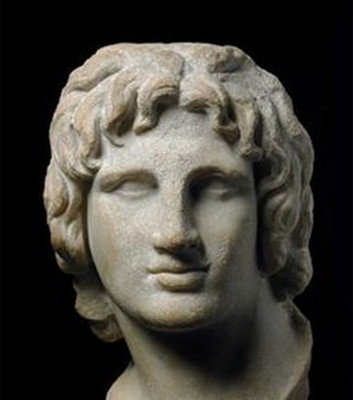What I'm looking at is the profile of a young man-his straight nose and his strong jaw line show classical good looks and strength, and he's looking keenly into the distance-the tilt of the head commanding and suggestive of vigorous forward movement.
上面鑄有年輕男子的頭像,鼻子與下巴的線條筆直,表現(xiàn)出古典美與力量。他凝視遠(yuǎn)方,前傾的頭部流露威嚴(yán),似乎要奮力向前。
We've got no way of knowing whether this is an accurate likeness of Alexander but it must be him, because as well as human hair this man has ram's horns.
我們無法了解這個頭像是否反映了他的真實相貌,但我們十分肯定他的身份,因為銀幣上的人除了人類的頭發(fā)之外,還有一對公羊角。
It's the horn symbol, well-known throughout the ancient world, that leaves the viewer in no doubt that we're looking at an image of Alexander the Great.
公羊角的象征意義在古代社會盡人皆知,毫無疑問,這就是亞歷山大。
The horns are associated with the god Zeus-Amon-a hybrid of the two leading Greek and Egyptian gods, Zeus and Amon.
公羊角所代表的宙斯-阿蒙神是希臘與埃及兩位最重要神祇的結(jié)合體。
So this small coin is making two big statements-it asserts Alexander's dominion over both Greeks and Egyptians, and it suggests that, in some sense, he is both man and god.
因此,這枚小小的銀幣具有雙重含義:其一,亞歷山大統(tǒng)治著希臘與埃及,其次,他既是凡人,也是神。
Alexander the man was the son of Philip II of Macedon, a small kingdom a few hundred miles north of Athens.
作為人的亞歷山大是馬其頓國王腓力二世之子。馬其頓是個位于雅典以北數(shù)百英里的小國。
Philip expected great things of his son and he employed the great philosopher Aristotle as Alexander's tutor.
腓力二世對兒子寄予厚望,聘請了著名的哲學(xué)家亞里士多德來教導(dǎo)他。
Alexander came to the throne in 336 BC at the age of 20, with an almost limitless sense of self-belief.
公元前三三二年,二十歲的亞歷山大登上王位, 自信滿滿,
His goal was to reach the "ends of the world and the Great Outer sea", and to do this he embarked on a series of wars, crushing rebellions by Athens and the other Greek cities, and then turning east to confront the long-standing enemy of the Greeks-Persia.
聲稱自己將到達(dá)“陸地與海洋的盡頭”。為完成這一宏愿,他發(fā)動了一系列戰(zhàn)爭,首先平息了雅典與其他希臘城市的反叛,然后揮師向東,討伐希臘的宿敵波斯。
Persia was at that point the greatest empire on earth, sprawling from Egypt across the Middle East and central Asia to India and almost to China.
波斯是當(dāng)時世界上最偉大的帝國,領(lǐng)土囊括埃及、中東、中亞,直達(dá)印度,幾乎與中國接壤。












